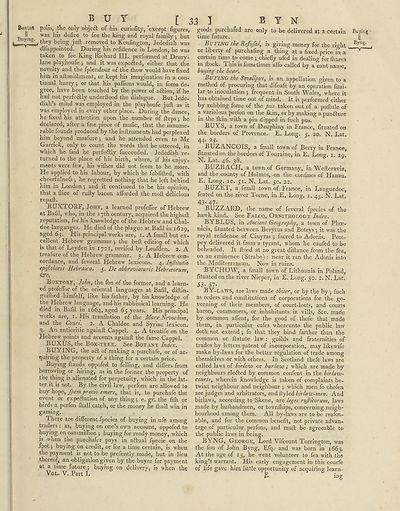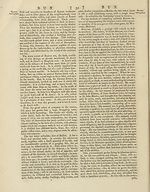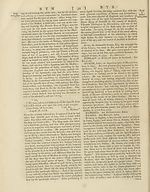Encyclopaedia Britannica, or, a Dictionary of arts, sciences, and miscellaneous literature : enlarged and improved. Illustrated with nearly six hundred engravings > Volume 5, BUR-CHI
(43) Page 33
Download files
Complete book:
Individual page:
Thumbnail gallery: Grid view | List view

[
Buying.
BUY
Buno* polls, tlie only objeft of his curiofity, 'except figures,
was his defire to fee the king and royal family ; but
, they being juft removed to Kenfington, Jedediah -was
difappointed. During his refidence in London, he was
taken to fee King Richard III. performed at Drury-
lane playhoufe j and it wras expefted, either that the
novelty and the fplendour of the (how would have fixed
him in aftonilhment, or kept his imagination in a con¬
tinual hurry j or that his paftions would, in fome de¬
gree, have been touched by the power of a&ion, if he
had not perfe&ly underftood the dialogue. But Jede-
diah’s mind was employed in the playhoufe juft as it
was employed in every other place. During the dance,
he fixed his attention upon the number of fteps j he
declared, after a fine piece of mufic, that the innume¬
rable founds produced by the inftruments had perplexed
him beyond meafure j and he attended even to Mr
Garrick, only to count the words that he uttered, in
which he faid he perfe&ly fucceeded. Jedediah re¬
turned to the place of his birth, where, if his enjoy¬
ments were few, his wifnes did not feem to be more.
He applied to his labour, by which he fubfifted, with
cheerfulnefs; he regretted nothing that he left behind
him in London and it continued to be his opinion,
that a (lice of rufty bacon afforded the moft delicious
repaft.
BUXTORF, John', a learned profeffor of Hebrew
Rt Bafil, who, in the I yth century, acquired the higheft
reputation, for his knowledge of the Hebrew and Chal¬
dee languages. He died of the plague at Bafil in 1629,
aged 65. His principal works are, 1. A fmall but ex-
33 I B Y N
goods purchafed are only to be delivered at a certain
time future.
Buting the Refufal, is giving money for the right
or liberty of purchafing a thing at a fixed price in a
certain time to come j chiefly ufed in dealing for (hares
in ftock. This, is fometimes alfo called by a cant name,
buying the bear.
Buying the Smallpox, is an appellation given to a
method of procuring that difeafe by an operation fimi
I Qr fn 1 r*r»r»n 1 of 1 • A-^4. I~ rl, XX1 1 •
cellent Hebrew grammar j the beft edition of which
is that of Leyden in 1701, revifed by Leufden. 2. A
treafure of the Hebrew grammar. 3. A Hebrew con¬
cordance, and feveral Hebrew lexicons. 4. Injlitutio
epijlolaris Hebraic a. 5. De abbreviaturis Hebrceorum,
fee.
Buxtorf, John, the fon of the former, and a learn¬
ed profeffor of the oriental languages at Bafil, diftin-
guifhed himfelf, like his father, by his knowledge of
the Hebrew language, and his rabbinical learning. He
died in Bafil in 1664, aged 65 years. His principal
works are, I. His tranflation of the More Nevochitn,
and the Co%ri. 2. A Chaldee and Syriac lexicon.
3. An anticritic againft Cappel. 4. A treatife on the
Hebrew points and accents againft the fame Cappel.
BUXUS, the Box-tree. See Botany Index.
BUYING, the a<5t of making a purchafe, or of ac¬
quiring the property of a thing for a certain price.
Buying ftands oppofed to felling, and differs from
borrowing or hiring, as in the former the property of
the thing is alienated for perpetuity, which in the lat¬
ter it is not. By the civil law, perfons are allowed to
buy hope, fpem precio emere, that is, to purchafe the
event or expeflation of any thing; e. gr. the fifli or
birds a perfon (hall catch, or the money he (hall win in
gaming.
I here are different fpecies of buying in ufe among
traders : as, buying on one’s own account, oppofed to
buying on commiffion ; buying for ready money, which
is when the purchafer pays in aftual fpecie on the
fpot} buying on credit, or for a time certain, is when
the payment is not to be prefently made, but in lieu
thereof, an obligation given by the buyer for payment
at a time future j buying on dcliverv, is when the
Vol.V. Parti.
lar to inoculation j frequent in South Wales, where it
has obtained time out of mind. It is performed either
by rubbing fome of the pus taken out of a puftule of
a variolous perfon on the (kin, or by making a pundture
in the (kin with a pin dipped in fueh pus.
BUYS, a town of Dauphiny in France, fituated on
the borders of Provence. E. Long. 5. 20. N. Lat.
44- 25*
BUZANCOIS, a fmall town of Berry in France,
fituated on the borders of Touraine, in E. Long. 1. 20.
N. Lat. 46. 38. ’ s y
BUZBACH, a town of Germany, in Wefteravia,
and the county of Holmes, on the confines of Hanau.
E. Long. 10. 51. N. Lat. 5c. 22.
BUZET, a fmall town of France, in Languedoc,
feated on the river Torne, in E. Long. 1. 45. N. Lat.
43- 47-
BUZZARD, the name of feveral fpecics of the
hawk kind. See Falco, Ornithology Index.
_ BYBLUS, in Ancient Geography, a town of Phoe¬
nicia, fituated between Berytus and Botrys; it was the
royal refidence of Cinyras ; facred to Adonis. Pom-
pey delivered it from a tyrant, whom he caufed to be
beheaded. It flood at no great diftance from the fea.,
on an eminence (Strabo) : near it ran the Adonis into
the Mediterranean. Now in ruins.
BYCHOW, a fmall town of Lithuania in Poland,
fituated on the river Nieper, in E. Long. 30. 2. N. Lat.
53- 57-
BY-laws, are laws made obiter, or by the by j fuch
as orders and conftitutions of corporations for the go¬
verning of their members, of court-leets, and courts
baron, commoners, or inhabitants in vills, &c. made
by common affent, for the good of thofe that made
them, in particular cafes whereunto the public law
doth not extend 5 fo that they bind farther than the
common or ftatute law : guilds and fraternities of
trades by letters patent of incorporation, may likewife
make by-laws for the better regulation of trade among
themfelves or with others. In Scotland thefe laws are
called laws of birlaxu or burlaw ; which are made by
neighbours ele&ed by common confent in the birlaw-
courts, wherein knowledge is taken of complaints be¬
twixt neighbour and neighbour ; which men fo chofen
are judges and arbitrators, and ftyle&birlaw-men. And
birlaws, according to Skene, are leges rujlicorum, laws
made by hufbandmen, or townfhips, concerning neigh¬
bourhood among them. All by-laws are to be reafon-
able, and for the common benefit, not private advan¬
tage of particular perfons, and muft be agreeable to
the public laws in being.
BYNG, George, Lord Vifcount Torrington, was
the fon of John Byng, Efq. and was born in 1663.
At the age of 15, he went volunteer to fea with the
king’s w-arrant. His early engagement in this courfe
of life gave him little opportunity of acquiring learn-
E ing
Buying.
BUY
Buno* polls, tlie only objeft of his curiofity, 'except figures,
was his defire to fee the king and royal family ; but
, they being juft removed to Kenfington, Jedediah -was
difappointed. During his refidence in London, he was
taken to fee King Richard III. performed at Drury-
lane playhoufe j and it wras expefted, either that the
novelty and the fplendour of the (how would have fixed
him in aftonilhment, or kept his imagination in a con¬
tinual hurry j or that his paftions would, in fome de¬
gree, have been touched by the power of a&ion, if he
had not perfe&ly underftood the dialogue. But Jede-
diah’s mind was employed in the playhoufe juft as it
was employed in every other place. During the dance,
he fixed his attention upon the number of fteps j he
declared, after a fine piece of mufic, that the innume¬
rable founds produced by the inftruments had perplexed
him beyond meafure j and he attended even to Mr
Garrick, only to count the words that he uttered, in
which he faid he perfe&ly fucceeded. Jedediah re¬
turned to the place of his birth, where, if his enjoy¬
ments were few, his wifnes did not feem to be more.
He applied to his labour, by which he fubfifted, with
cheerfulnefs; he regretted nothing that he left behind
him in London and it continued to be his opinion,
that a (lice of rufty bacon afforded the moft delicious
repaft.
BUXTORF, John', a learned profeffor of Hebrew
Rt Bafil, who, in the I yth century, acquired the higheft
reputation, for his knowledge of the Hebrew and Chal¬
dee languages. He died of the plague at Bafil in 1629,
aged 65. His principal works are, 1. A fmall but ex-
33 I B Y N
goods purchafed are only to be delivered at a certain
time future.
Buting the Refufal, is giving money for the right
or liberty of purchafing a thing at a fixed price in a
certain time to come j chiefly ufed in dealing for (hares
in ftock. This, is fometimes alfo called by a cant name,
buying the bear.
Buying the Smallpox, is an appellation given to a
method of procuring that difeafe by an operation fimi
I Qr fn 1 r*r»r»n 1 of 1 • A-^4. I~ rl, XX1 1 •
cellent Hebrew grammar j the beft edition of which
is that of Leyden in 1701, revifed by Leufden. 2. A
treafure of the Hebrew grammar. 3. A Hebrew con¬
cordance, and feveral Hebrew lexicons. 4. Injlitutio
epijlolaris Hebraic a. 5. De abbreviaturis Hebrceorum,
fee.
Buxtorf, John, the fon of the former, and a learn¬
ed profeffor of the oriental languages at Bafil, diftin-
guifhed himfelf, like his father, by his knowledge of
the Hebrew language, and his rabbinical learning. He
died in Bafil in 1664, aged 65 years. His principal
works are, I. His tranflation of the More Nevochitn,
and the Co%ri. 2. A Chaldee and Syriac lexicon.
3. An anticritic againft Cappel. 4. A treatife on the
Hebrew points and accents againft the fame Cappel.
BUXUS, the Box-tree. See Botany Index.
BUYING, the a<5t of making a purchafe, or of ac¬
quiring the property of a thing for a certain price.
Buying ftands oppofed to felling, and differs from
borrowing or hiring, as in the former the property of
the thing is alienated for perpetuity, which in the lat¬
ter it is not. By the civil law, perfons are allowed to
buy hope, fpem precio emere, that is, to purchafe the
event or expeflation of any thing; e. gr. the fifli or
birds a perfon (hall catch, or the money he (hall win in
gaming.
I here are different fpecies of buying in ufe among
traders : as, buying on one’s own account, oppofed to
buying on commiffion ; buying for ready money, which
is when the purchafer pays in aftual fpecie on the
fpot} buying on credit, or for a time certain, is when
the payment is not to be prefently made, but in lieu
thereof, an obligation given by the buyer for payment
at a time future j buying on dcliverv, is when the
Vol.V. Parti.
lar to inoculation j frequent in South Wales, where it
has obtained time out of mind. It is performed either
by rubbing fome of the pus taken out of a puftule of
a variolous perfon on the (kin, or by making a pundture
in the (kin with a pin dipped in fueh pus.
BUYS, a town of Dauphiny in France, fituated on
the borders of Provence. E. Long. 5. 20. N. Lat.
44- 25*
BUZANCOIS, a fmall town of Berry in France,
fituated on the borders of Touraine, in E. Long. 1. 20.
N. Lat. 46. 38. ’ s y
BUZBACH, a town of Germany, in Wefteravia,
and the county of Holmes, on the confines of Hanau.
E. Long. 10. 51. N. Lat. 5c. 22.
BUZET, a fmall town of France, in Languedoc,
feated on the river Torne, in E. Long. 1. 45. N. Lat.
43- 47-
BUZZARD, the name of feveral fpecics of the
hawk kind. See Falco, Ornithology Index.
_ BYBLUS, in Ancient Geography, a town of Phoe¬
nicia, fituated between Berytus and Botrys; it was the
royal refidence of Cinyras ; facred to Adonis. Pom-
pey delivered it from a tyrant, whom he caufed to be
beheaded. It flood at no great diftance from the fea.,
on an eminence (Strabo) : near it ran the Adonis into
the Mediterranean. Now in ruins.
BYCHOW, a fmall town of Lithuania in Poland,
fituated on the river Nieper, in E. Long. 30. 2. N. Lat.
53- 57-
BY-laws, are laws made obiter, or by the by j fuch
as orders and conftitutions of corporations for the go¬
verning of their members, of court-leets, and courts
baron, commoners, or inhabitants in vills, &c. made
by common affent, for the good of thofe that made
them, in particular cafes whereunto the public law
doth not extend 5 fo that they bind farther than the
common or ftatute law : guilds and fraternities of
trades by letters patent of incorporation, may likewife
make by-laws for the better regulation of trade among
themfelves or with others. In Scotland thefe laws are
called laws of birlaxu or burlaw ; which are made by
neighbours ele&ed by common confent in the birlaw-
courts, wherein knowledge is taken of complaints be¬
twixt neighbour and neighbour ; which men fo chofen
are judges and arbitrators, and ftyle&birlaw-men. And
birlaws, according to Skene, are leges rujlicorum, laws
made by hufbandmen, or townfhips, concerning neigh¬
bourhood among them. All by-laws are to be reafon-
able, and for the common benefit, not private advan¬
tage of particular perfons, and muft be agreeable to
the public laws in being.
BYNG, George, Lord Vifcount Torrington, was
the fon of John Byng, Efq. and was born in 1663.
At the age of 15, he went volunteer to fea with the
king’s w-arrant. His early engagement in this courfe
of life gave him little opportunity of acquiring learn-
E ing
Set display mode to:
![]() Universal Viewer |
Universal Viewer | ![]() Mirador |
Large image | Transcription
Mirador |
Large image | Transcription
Images and transcriptions on this page, including medium image downloads, may be used under the Creative Commons Attribution 4.0 International Licence unless otherwise stated. ![]()
| Permanent URL | https://digital.nls.uk/192984828 |
|---|
| Attribution and copyright: |
|
|---|
| Description | Ten editions of 'Encyclopaedia Britannica', issued from 1768-1903, in 231 volumes. Originally issued in 100 weekly parts (3 volumes) between 1768 and 1771 by publishers: Colin Macfarquhar and Andrew Bell (Edinburgh); editor: William Smellie: engraver: Andrew Bell. Expanded editions in the 19th century featured more volumes and contributions from leading experts in their fields. Managed and published in Edinburgh up to the 9th edition (25 volumes, from 1875-1889); the 10th edition (1902-1903) re-issued the 9th edition, with 11 supplementary volumes. |
|---|---|
| Additional NLS resources: |
|

